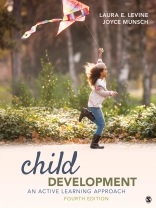In the topically organized
Child Development: An Active Learning Approach, Fourth Edition, authors Laura E. Levine and Joyce Munsch take students on an active journey toward understanding children and their development. Active Learning activities integrated throughout the text capture student interest and turn reading into an engaged learning process. Through the authors’ active learning philosophy, students are challenged to test their knowledge, confront common misconceptions, relate the material to their own experiences, and participate in real-world activities independently and with children. Because consuming research is equally important in the study of child development, Journey of Research features provide both historical context and its links to today’s cutting-edge research studies. Students will discover the excitement of studying child development while gaining skills they can use long after course completion.
This title is accompanied by a complete teaching and learning package.
Содержание
Preface
Acknowledgments
About the Authors
PART I. UNDERSTANDING DEVELOPMENT: WHY AND HOW WE STUDY CHILDREN AND ADOLESCENTS
CHAPTER 1. Issues and Themes in Child Development
Why Study Child Development?
Understanding How Development Happens
Contexts of Development
Be a Smart Consumer of Information About Development
Conclusion
Chapter Summary
Key Terms
CHAPTER 2. Theories of Development
Why Theories of Development Are Important
Theories of Child and Adolescent Development
Theories of Child Development in Historical and Cultural Context
Conclusion
Chapter Summary
Key Terms
CHAPTER 3. How We Study Development
The Scientific Method
How Research Is Designed
Interpreting and Communicating the Results of a Study
Ethics in Research With Children and Adolescents
Conclusion
Chapter Summary
Key Terms
PART II. BIOLOGICAL BEGINNINGS AND PHYSICAL DEVELOPMENT
CHAPTER 4. Nature Through Nurture: Genes and Environment
The Study of Genetics and Behavior
Molecular Genetics: Chromosomes, Genes, and DNA
Genetic Disorders
Behavioral Genetics
The Interaction of Genes and Environment
Conclusion
Chapter Summary
Key Terms
CHAPTER 5. Prenatal Development, the Newborn, and the Transition to Parenthood
Prenatal Development
Health and Risks in Pregnancy
The Birth Experience
The Newborn
The Transition to Parenthood
Conclusion
Chapter Summary
Key Terms
CHAPTER 6. Physical Development: The Brain and the Body
Brain Development
Development of the Senses
Body Growth and Changes
Motor Development
Nutrition
Conclusion
Chapter Summary
Key Terms
PART III. COGNITIVE DEVELOPMENT
CHAPTER 7. Theories of Cognitive Development
Piaget’s Theory of Cognitive Development
Theory of Core Knowledge
Vygotsky’s Sociocultural Theory of Cognitive Development
Information Processing
Comparing Four Theories of Cognitive Development
Conclusion
Chapter Summary
Key Terms
CHAPTER 8. Intelligence and Academic Achievement
Defining and Assessing Intelligence
Variations in Intellectual Ability
Academic Achievement: Non-cognitive Factors
Group Differences in Academic Achievement
Academic Achievement: Learning in the School Context
Conclusion
Chapter Summary
Key Terms
CHAPTER 9. Language Development
Aspects of Language
Language and the Brain
Theories of Language Development
Stages of Language Development
Literacy: Reading and Writing
Bilingualism and Bilingual Education
Language Disorders
Conclusion
Chapter Summary
Key Terms
PART IV. SOCIAL AND EMOTIONAL DEVELOPMENT
CHAPTER 10. Emotional Development and Attachment
Emotions: Universality and Difference
Temperament
Emotion Regulation and Self-Control
Normal Emotions and Emotional Problems
The Development of Secure Attachment
Attachment Disorders
Conclusion
Chapter Summary
Key Terms
CHAPTER 11. Identity: The Self, Gender, and Moral Development
Development of Self-Concept
Development of Self-Esteem
Gender Identity
Ethnic and Racial Identity
Moral Identity
Conclusion
Chapter Summary
Key Terms
CHAPTER 12. Social Development: Social Cognition and Peer Relationships
Social Cognition: Theory of Mind
Peer Relationships in Infancy and Early Childhood
Peer Relationships in Middle Childhood
Adolescents: The World of Peers
Bullying, Cyberbullying, and School Violence
Conclusion
Chapter Summary
Key Terms
PART V. CONTEXTS FOR DEVELOPMENT
CHAPTER 13. Families
What Constitutes a Family?
Family Roles and Relationships
Socialization in Childhood and Adolescence
Interventions for a Better Family Life
Conclusion
Chapter Summary
Key Terms
CHAPTER 14. Activities, Media, and the Natural World
Unstructured Time and the Natural World
Electronic Media Use
Structured Time
The Role of Important Nonparental Adults
Conclusion
Chapter Summary
Key Terms
CHAPTER 15. Health, Well-Being, and Resilience
Stress and Coping
Physical Illness and Mental Disorders
Other Threats to Health and Well-Being
Challenges to Positive Child Development
Resilience
Conclusion
Chapter Summary
Key Terms
Glossary
References
Author Index
Subject Index
Об авторе
Joyce Munsch received her Ph D in human development and family studies from Cornell University. She was a faculty member in human development and family studies at Texas Tech University for 14 years, where she also served as associate dean for research in the College of Human Sciences for 2 years. In 2002, Dr. Munsch went to the California State University at Northridge as the founding chair and professor in the Department of Child and Adolescent Development. She currently is an emeritus professor in the Department. Dr. Munsch’s research has focused on adolescent stress and coping and social network research. Her work has been published in the Journal of School Psychology, Adolescence, The Journal of Early Adolescence, the Journal of Research on Adolescence, and the American Journal of Orthopsychiatry. Throughout her career, Dr. Munsch administered grants that supported community-based programs. She was the codirector of the Early Head Start program at Texas Tech University and co–principal investigator for three Texas Youth Commission (Department of Juvenile Justice) grants. At Cal State Northridge, she administered the Jumpstart program for over 10 years. Her commitment to community service learning was recognized in 2005 when she was awarded the CSUN Visionary Community Service Learning Award. In 2012, her service to the County of Los Angeles was recognized by a commendation from the County Board of Supervisors. At Texas Tech, she was the College of Human Sciences nominee for the Hemphill-Wells New Professor Excellence in Teaching Award, the Barnie E. Rushing Jr. Faculty Distinguished Research Award, the El Paso Energy Foundation Faculty Achievement Award, and the President’s Excellence in Teaching Award, and she received the Kathryn Burleson Faculty Service Award and the College of Human Sciences Outstanding Researcher Award.












